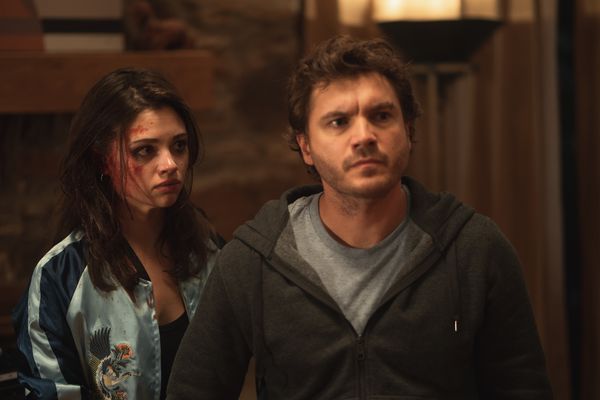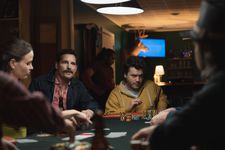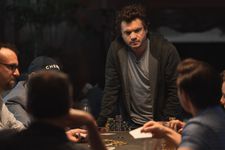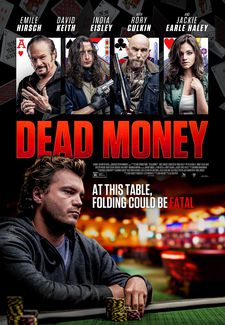 |
| India Eisley and Emile Hirsch in Dead Money |
Opening in US cinemas this weekend, Dead Money is the latest film starring Emile Hirsch, whose combination of Hollywood hits and gutsy independent thrillers has won him an extensive fan following. Here, he plays Andy, a small time professional poker player who, together with girlfriend Chloe (India Eisley), finds himself in deep water after helping himself to a large sum of money belonging to a gang who stole from him. It’s a film which was personally interesting to the actor because, as he explains when he meet, he plays a bit of poker himself.
“I would say I had a loose interest in poker before the movie,” he says. “I was a terrible player. I would lose and just quit for years at a time. And so when I got the script, I was sort of like, ‘This could be a way to play again. This could open Pandora's box to me playing.’ So it was a lot of fun to research. It was a lot of fun to get into the world of and these really high stakes players.”
 |
| Dead Money |
One of the filmmakers is such a player, he says, and wanted to him to experience a game at that level so that he could understand his character better.
“They flew me to Vegas, and I played, like, we're talking six figures of massive size. And I'm playing with these crazy amounts of money and, like, losing. The first day I lost six figures. Literally, I couldn't believe it. And then the second day, I was losing even more. And then I just shut down, and I folded for three hours. And then I came back to even and was like, ‘I'm done.’ I mean, before this, the most I'd ever played poker for was maybe a couple hundred dollars buy in or something. You know what I mean? So it was surreal.
“It was weird. It's crazy hanging out with these guys that gamble amounts of money that most people make in, like, a year, or years and years, and just seeing that kind of, almost like Wolf Of Wall Street level of excess. Just seeing the guys and girls in that world – that's just the way that they live. But, you know, it's also like ‘Oh, my gosh, this guy just turned $50,000 into a million dollars in one night!’ But you don't always turn $50,000 into a million dollars in one night. There are some times where you lose a million dollars.
“With these professional gamblers, it's like, okay, well, if you had a million dollars, you could go to Vegas right now and put it all on black, and you'd have a 49% chance of winning or something like that. Maybe you'd have $2 million, and you didn't have to do barely any work. Suddenly you have $2 million, but no one's going to do that because the risk.” He shrugs. “Poker is a maddening game in a lot of ways, but it's a lot of fun.”
He notes that whilst his character, Andy, is used to playing at a higher level than average, he’s not used to the stakes being in the hundreds of thousands. In the course of the film, however, that’s where he finds himself.
I suggest that although Andy’s play is very calm, the way that he talks about the game suggests that he's on the edge of having an unhealthy relationship with it.
“Yeah, for sure. I definitely found myself googling ‘gambling addiction’. What is gambling addiction? Cause I'd be sitting around, and I'd be like, ‘I have the desire to get in my car and drive to a card game right now.’ You know? Even after I lost, the next day I'd be like, ‘Oh, I could probably win today.’ I was able to let go of losses and things like this, which is just crazy.
 |
| Dead Money |
“Andy, really, he tries to talk about reason and being rational, but does a lot of really irrational, emotionally based decisions and things that any good player would not do. He's very impulsive, and that can help him in the game of poker. But it can also get you in a lot of trouble. It's gotten me in a lot of trouble just at the card table, making super impulsive decisions. Like, I've done bluffs, gone all in with nothing and had people fold. I mean, stuff that you just should not do. And it's so much fun to play like that. If you play like some robot following your graph, poker is not that fun. If you play like you're freaking in the OK Corral and everyone's just dodging your bullets, it's way more fun.”
It’s a tricky subject for a film – trying to combine poker faces with acting.
“If you've ever played that game Mafia or, like, Werewolves and Villagers with your friends or anything like that, where you're trying to figure out who's lying - when you play those games, you really very quickly figure out, like, it is really hard to tell if someone's lying or not,” he says. “Like, it's super hard. To actually put an accurate read on what card someone really has, it's incredibly difficult. I mean, a few people can kind of do it, but it's really hard. And as soon as someone figures out something about someone's tells or their poker face, the player can always just switch it or just change it or do the exact opposite. And then even if they're doing that thing and you think you have an accurate read on what someone's cards might be, then you have to wonder, ‘Well, maybe they're just acting that way to make me think that,’ you know? The whole mind job.”
Like many of the characters he plays, Andy isn’t conventional hero material, though viewers are still likely to find themselves warming to him.
“Andy makes questionable decisions, for sure,” he says. “For me, he was a little bit more of a good guy than the guys around him, right? So he has his flaws, but if you stack him up against everyone else in the room, he's probably the nice guy in the room. He's probably the most chill among the den of criminals that he hangs out with, the nice one. You know, if you were to pick him out of a line-up, he'd probably still be in the line-up, but he's the nice one in the line-up.”
I note that director Luc Walpoth, whose Baby Money screened at Fantasia in 2021, also has a clear fondness for characters like that.
“He's very good with actors, Luc,” says Emile, “and he's very meticulous about casting. All the actors he got, I thought, were just fantastic. And that's one of the things about the film, is that it's a really strong ensemble. In every role, every actor is interesting. He put so much care into the casting, and it really enhanced it.”
 |
| Dead Money |
Emile often finds himself alongside very strong female characters, even when they're seven-years-old, like Freaks’ Lexy Kolker. What was it like working with India on this one?
“She was so awesome,” he says. “Such a good actress and so knowledgeable about movies and film, and passionate about movies, like a nerd for movies, and that's awesome. And that's so cool to work with someone that's that knowledgeable in that way. Movies and filmmakers and performances and pop culture. She had seen everything. I've seen a bunch of movies. I'm not like Tarantino or anything, but I've seen a lot of movies. And she has seen a lot of movies, so it was great.
“I like to rehearse sometimes, so we would run the scenes. You know, it shouldn't feel like a play, but sometimes if actors don't rehearse at all, there's just a weird quality to it, which sometimes works and sometimes you're not hitting the levels that you could be hitting if you've done it a few times. It's just reality. You know, a lot of actors do some of their best work when they're really comfortable, and sometimes they get to that place because they rehearsed it. Look at what David Fincher does. He does so many takes. You could argue doing a lot of takes, it's just like he had his actors rehearse a lot, you know?”
I tell him that I wondered about that, because he’s been so prolific in the last few years. Prep, rehearsals, shooting – how does he fit it all in?
“Some of the films I've done in the last few years have been not super long shoots,” he says, “so that's sort of why I can do more of them. It's like, well, this movie only shoots for three weeks. I'm like, ’Okay, it's an interesting filmmaker. I like the script.’ You know? I like making things. You know, I love Daniel Day-Lewis, but the idea of just sitting around and not acting anymore, I don't like that. I actually have fun acting. I like doing it, you know? So I wouldn't want to be just not doing anything. I mean, maybe he's doing other stuff, but the stuff that I like doing is acting related.”
I mention seeing him in Prey earlier this year, which looked like a fun one.
“Yeah.” He laughs. “It was kind of challenging to make that film because we shot in Valencia, California, in the winter, and it was supposed to be in South Africa in the summer. So we were freezing, and we were supposed to be acting like we were dehydrated because it was so hot. So we were in all these cut-off sleeve t shirts, shirtless, and we were freezing every day, going to set and there was just cold mud on the ground everywhere you could see.”
He seems to have a pretty rough time in films in general, I note. He’s always getting beaten up.
 |
| Dead Money poster |
“I know! I don't know why these filmmakers are like, ‘This guy can handle it,’ you know? I mean, I'm an LA guy. Sean [Penn] had no business casting me in Into The Wild as an outdoorsy survivalist. But, you know, I guess they think I'm up to the job.”
This particular film sees his character getting punched in the face really early on. How does he prepare for a scene like that?
“ I think having good makeup makes a big difference,” he says. “If you can have a real black eye or a real look like you got roughed up, it makes a big difference. And certain actors, you know, they are a little bit more rough in their fight scenes and stuff. It's always a fine line because you don't want some actor to be like, oh, suddenly he's a method actor when he has to beat you up. You know what I mean? It's like, ‘Oh yeah. You weren't a committed actor when it was the scene where you weren't kicking the shit out of me,’ you know? So there's a little give and take there.”
He has three other films that he wants to let us know about.
“There's The Engineer, which came out on Netflix already. Inside Man is on Prime now, and that's kind of like a Goodfellas meets Donnie Brasco, New York kind of crime thriller, undercover cops and infiltrating the mob. It's really well done. And then there's another film that I did after Dead Money called Bao: Artist At War, which is a really cool movie. It's based off the life of Joseph Bao, and Sean McNamara directed it, who directed Soul Surfer and the new Reagan movie. It's a really inspiring love story about this couple that met in a concentration camp, fell in love, and actually got married in this concentration camp. It's a true story. He was this artist cartoonist, and later on he would testify against Nazis at the war crimes court and everything. It's a really moving story.”
Dead Money is in US cinemas from Friday 13 September.





















